NCERT Solutions for Class 10 English Main Course Book Unit 4 Chapter 2 Heroes of the Environment are part of NCERT Solutions for Class 10 English. Here we have given NCERT Solutions for Class 10 English Main Course Book Unit 4 Chapter 2 Heroes of the Environment.
| Board | CBSE |
| Textbook | NCERT |
| Class | Class 10 |
| Subject | English Main Course Book |
| Chapter | Unit 4 Chapter 2 |
| Chapter Name | Heroes of the Environment |
| Category | NCERT Solutions |
CBSE Class 10 English Main Course Book Unit 4 Environment Chapter 2 Heroes of the Environment
TEXTUAL EXERCISES
Question 1.
Read the following Newspaper story :
Answer:
Sherpa to clean Mount Everest
Question 2.
On the basis of your reading of the news story, complete the following table after a group discussion.
| Adverse environmental effects of tourism and adventure sports. |
(a) ……………………………………………… (b) ……………………………………………… (c) ……………………………………………… (d) ……………………………………………… |
| Ways to prevent it |
(e) ……………………………………………… (f) ……………………………………………… (g) ……………………………………………… (h) ……………………………………………… |
Answer:
(a) leaving behind trash and
(b) climbing equipment
(c) food containers, eg, tins, plastics, glass, clothes, tents
(d) dead bodies
(e) checking what is being carried and what is to be brought back after being used
(f) fixing personal responsibility for keeping the leftovers with the self
(g) charging high penalty for breaking rules framed
(h) banning climbing if found guilty of breach of rules.
Question 3.
Now imagine you are in charge of a Mountaineering Expedition to Mount Everest. You have to address the first time climbers. Write the instructions that you would give to the climbers on keeping the track clean besides giving instructions on safety measures. Instruct how they can contribute in preventing the Everest from becoming, “The highest junkyard in the world”.
Answer:
- (c) Simple Present
- (a) At the beginning of a sentence or a clause
- (b) Mixed length
- (a) So that the reader can understand more easily
- (b) The order in which the instructions have to be carried out
- (b) Yes.
ADDRESS TO THE FIRST-TIME CLIMBERS
Gentlemen
Being Incharge of the Mountaineering Expedition to Mount Everest, I welcome you all to this world’s most arduous climb. I presume that you do not need any extra instructions, guidance and advice. However, I would expect you all to take a special care of a few things. These are like keeping the track clean and guarding yourself against eventual dangers. These safety measures as well as keeping the track clean will make the climb for the next generation an enjoyable adventure sport. First how to keep the track clean :
To keep the Track Clean :
- Don’t throw the trash on the track or to its sides.
- Plastics, food wrappers, empty tins, aluminium cans, glass, papers, etc, should be put in a separate bag and brought back.
- Anything that is not per: sh able should not be left behind. You know these things don’t rot and add to the spoiling of the place.
- Kitchen waste, if any, while cooking in the tents must also not be left on the track.
- Anything that adds to the ugliness of the place should not be thrown anywhere.
On Safety Measures :
- You know, safety counts the most important. Wear your woollen gear as per the specifications for climbing tie Everest.
- Take all the necessary equipments with you as per the climbing manual.
- Ropes, snow axes, knife, gloves etc, that form a part of the climbing equipment should be used very judiciously.
- Crevices in the snow may face you. Be very vigilant as it takes seconds to lose one’s life if one ignores them. Double check everything before starting the most difficult climb.
- Various gadgets like wireless sets, batteries and other communication equipments should be checked to be in perfect working order.
- Don’t forget to give an SOS in case you fall into a dangerous situation
How you can contribute in preventing the Everest from becoming ‘The Highest junkyard in the World’
I have already invited your attention on how to keep the track clean. You all must ensure that no wrappers of food items, tins, plastics, bottles, food items or leftovers of anything must be thrown. In fact, no trace that you ever pitched your tents should be seen. It is in your own hands to keep the track and Mount Everest neat, clean and unspoilt. The leftovers, if any, must be brought back down. I hope you’ll cooperate in this public cause.
Thanks a lot.
Question 4.
How to design a Poster ?
Design a poster for promoting cleanliness in the surroundings of your colony.
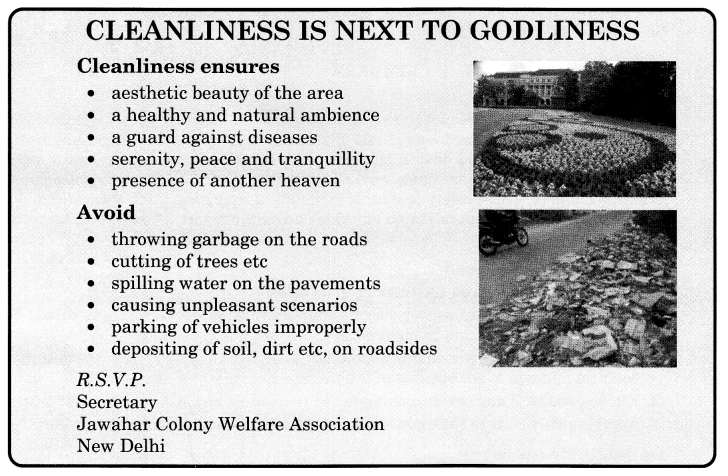
On the basis of this, design a poster urging mountaineers to preserve the pristine glory of the mountainsides. Work in groups of 4-5.
Answer:
Students to design a poster on their own as directed. One version is given below :
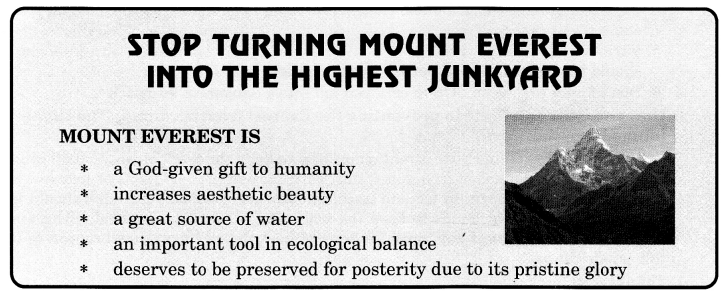
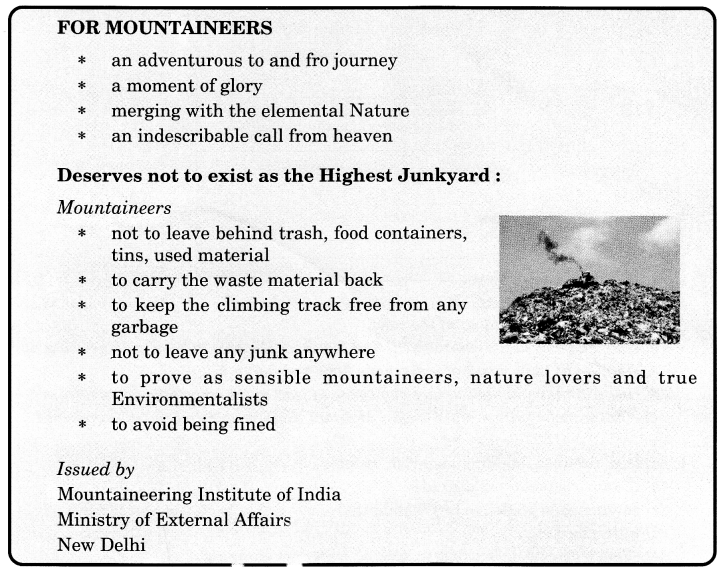
Question 5.
Wangari Maathai started the green Belt Movement and also fought for equal rights for women in Africa. She is the first African woman to win the Nobel Peace Prize. Read the excerpts from her interview with NHK Radio (Japan).
Answer:
See the summary and word notes in the beginning of the chapter.
Question 6.
Based on your reading of Wangari Maathai’s interview answer the following questions :
- Complete the tree of environment :

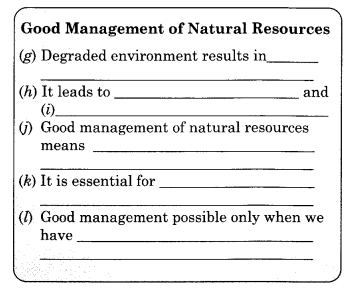
- How does Wangari Maathai explain the essential components of development ? Label and explain the analogy of the stool.
- What changes in the environment had Wangari Maathai noticed after growing up ?
- What is the importance of indigenous flora and fauna ?
- How did the campaign to save environment lead to the empowerment of women ?
- What transformation did Wangari Maathai see in people and the environment ?
Answer:
1.
(a) food, firewood, building material, water
(b) the environment was degraded
(c) environment needed to be rehabilitated
(d) water, food etc
(e) climate change, lack of water, ground water not charging
(f) help in the rehabilitating of the forests
(g) loss of rain, climate change and change in weather patterns
(h) shortage of water
(i) a change of rainfall patterns
(J) supporting communities
(k) peace all over the world
(l) equitable distribution of natural resources
2.
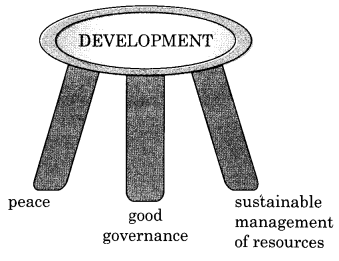
3. All the flora and fauna had disappeared. Forests which were the water towers were no longer able to contain the water. Weather patterns changed and rain became less.
4. Indigenous flora and fauna ensure forests which act as water towers. These prevent soil-erosion and contain the water from flowing into the sea. Local biological diversity is well protected by the indigenous flora and fauna.
5. Women responded to Maathai’s call to plant more and more trees. They soon understood the importance as they could sell the trees after five or ten years. This provided them with the necessary income. With that they got confidence, a sense of pride, of dignity. This amounted to empowering them.
6. The women planted trees. They sold them after five or ten years. This gave them income, sense of pride and dignity. This gave them power. Besides this the landscape was transformed. Birds and rabbits came back and made the environment beautiful.
Question 7.
Match the ‘environment words’ with their meanings.
| Words | Meanings |
| (a) ecology | (i) A person who advocates preservation and careful management of natural resources. |
| (b) habitat | (ii) The variety and variability among living organisms and the ecological complexes in which they occur. |
| (c) herpetologist | (iii) The relationship of living things to one another and their environment, or the study of such relationships. |
| (d) extinct | (iv) Tropical evergreen trees or shrubs forming dense thickets along tidal shores. |
| (e) aquifer | (v) A place where a population lives and its surroundings, both living and non-living. |
| (f) naturalist | (vi) A zoologist who studies reptiles and amphibians. |
| (g) biodiversity | (vii) Having no living representative. |
| (h) mangrove | (viii) An underground geological formation, containing water. |
| (i) conservationist | (ix) A person who studies plants and animals, especially outdoors. |
Answer:
(a) → (iii)
(b) → (v)
(c) → (vi)
(d) → (vii)
(e) → (viii)
(f) → (ix)
(g) → (ii)
(h) → (iv)
(i) → (i)
Question 8.
Identify an area in India that needs efforts on a war footing to conserve the bio system. On the model of Wangari Maathai’s efforts, prepare in groups a power point presentation covering the environmental problem, causes, effects and solutions. Each student in the group should present a part of the presentation.
Answer:
Classroom activity. Students to prepare in groups a power point presentation covering the environmental problem, causes, effects and solution. The following information shall help them a lot in this effort.
Area identified that needs efforts to conserve the biosystem
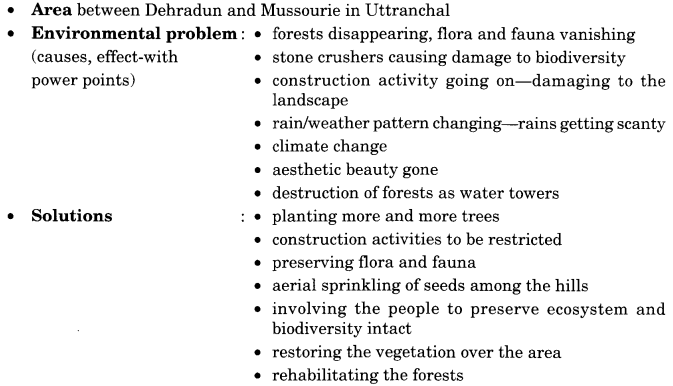
Question 9.
After reading the interview of Wangari Maathai, you are inspired and motivated to do a summer training under her at one of the Research Stations. Write an email to Wangari Maathai. In your mail describe Wangari’s influence on you and your desire to work under her and why you should be given a chance to work under her.
Answer:
Date : 24 October, 20 – –
From : praveenl5@gmail.com
To : wangarimaathai@yahoo.com
Subject : Summer Training at a Research Station
Dear Ms Maathai
I am pleased to introduce myself as a great fan of yours. I have read your interview to NHK Radio, Japan and feel greatly inspired. I feel motivated to do a summer training under you at one of the Research Stations.
I am a nature lover and feel greatly pained at the denudation and deforestation almost everywhere. It pains me much to see trees being cut for widening of the roads. It is shocking to see that fertile land is being taken over for commercial purposes. Forests and flora and fauna are disappearing causing weather changes, drop in rainfall and depletion in the ground water table. Wetlands and other water bodies are drying up. I fear for the coming of desertification in areas where there used to be lush green forests once. Not many water harvesting efforts are taken in hands. As a consequence, global warming is showing its painful face. If this goes on, we may soon face the pricking of famines, droughts etc. Food, fodder, fuel, timber wood etc, would not be in plenty. It will result in various problems that might threaten the human life.
I have a keen desire to work under you and to learn how we can rehabilitate the forests and bring back the biodiversity. I personally feel that the scene which you saw before starting your Movement is available here. If we do not take any action, the situation may worsen more. Precisely speaking, I find the force of your movement most appropriate in whatever I wish to do to rehabilitate our environment.
Thanking you
Regards : Yours sincerely
Praveen
We hope the NCERT Solutions for Class 10 English Main Course Book Unit 4 Chapter 2 Heroes of the Environment help you. If you have any query regarding NCERT Solutions for Class 10 English Main Course Book Unit 4 Chapter 2 Heroes of the Environment, drop a comment below and we will get back to you at the earliest.